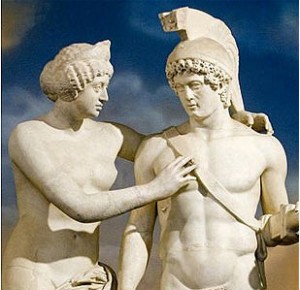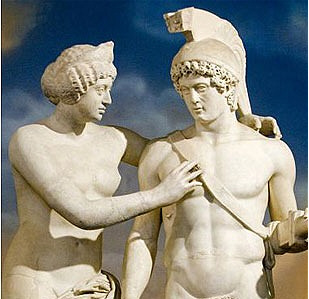Love, Marriage, and the Epicurean in the Modern World
 This past week I received a very interesting set of emails from a fan of Epicurus by the name of Maruli Marulaki, who related to me her desire to find a romantic match who shares her Epicurean viewpoint toward life. Maruli pointed me to an internet page she set up last year, and asked if I would post about her efforts to set up a new web resource through which fans of Epicurus who are single might more readily find each other to explore romantic possibilities. I responded that I would be happy to assist her, but before we get into the details, let’s first review some of the basics of what we know about the attitude of the ancient Epicureans toward romantic love.
This past week I received a very interesting set of emails from a fan of Epicurus by the name of Maruli Marulaki, who related to me her desire to find a romantic match who shares her Epicurean viewpoint toward life. Maruli pointed me to an internet page she set up last year, and asked if I would post about her efforts to set up a new web resource through which fans of Epicurus who are single might more readily find each other to explore romantic possibilities. I responded that I would be happy to assist her, but before we get into the details, let’s first review some of the basics of what we know about the attitude of the ancient Epicureans toward romantic love.
As I have discussed in earlier posts, there is a maddening discrepancy in the various translations of Diogenes Laertius in the crucial “Wise Man” sequence. CD Yonge’s 1853 translation reports that Epicurus thought marriage to be a bad idea: “Marriage, they say, is never any good to a man, and we must be quite content if it does no harm; and the wise man will never marry or beget children, as Epicurus himself lays down in his Doubts and in his treatises on Nature. Still, under certain circumstances in his life he will forsake these rules and marry.”
The Loeb Classical Library version of the R.D. Hicks translation, which dates from 1931, concurs: “Nor, again, will the wise man marry and rear a family: so Epicurus says in the Problems and in the De Natura. Occasionally he may marry due to special circumstances in his life.”
But Cyril Bailey in his 1926 translation says the opposite: “Moreover, the wise man will marry and have children, as Epicurus says in the Problems and in the work On Nature. But he will marry according to the circumstances of his life.”
The more modern Epicurus Reader translation by Inwood and Gerson agrees with Bailey: “And indeed the wise man will marry and father children….” The 1963 text by George Strodach endorses the same view: “In addition, the wise man will marry and beget children…. but he will marry according to his station in life, whatever it may be.”
In my view, this question is best answered by the observation that Epicurus himself provided in his last will and testament that the child of his valued student Metrodorus be married off to an Epicurean when she came of age. As Yonge translates: “In the same way also, they [Amynomachus and Timocrates] shall be the guardians of the daughter of Metrodorus, and when she is of marriageable age, they shall give her to whomsoever Hermarchus shall select of his companions in philosophy, provided she is well behaved and obedient to Hermarchus.”
It seems clear to me, therefore, that Epicurus held that marriage and child-bearing are natural, proper, and beneficial activities in which to engage, so long as partners are properly educated in and devoted to Epicurean principles of living.
It seems to me that this conclusion is also a logical extension of the very clear Epicurean principle that “friendship” is central to living a happy life. As Cicero wrote in “On Ends,” Epicurus “pronounced in regard to friendship that of all the means to happiness that wisdom has devised, none is greater, none is more fruitful, none is more delightful than friendship.” A happy marriage to one who is not only one’s mate but also one’s best friend would certainly seem to be a logical application of this principle.
We do, however, also have to consider the very strong cautions that abound in Epicurean literature against taking an unrealistic attitude toward romantic love. In addition to the admonitions stated in the Wise Man section cited above, there is the famous Vatican Saying 51, which contains what is widely regarded to be Epicurus’ advice to a young man: “You tell me that the stimulus of the flesh makes you too prone to the pleasures of love. Provided that you do not break the laws or good customs and do not distress any of your neighbors or do harm to your body or squander your pittance, you may indulge your inclination as you please. Yet it is impossible not to come up against one or other of these barriers, for the pleasures of love never profited a man and he is lucky if they do him no harm.”
And again from Cicero’s On Ends, we see the Epicurean advocate listing those who are “enslaved to the follies of love” as among those men whose failings “render their lives one unbroken round of misery.”
And perhaps most famously of all, we have the long dissertation of Lucretius at the end of Book IV, which reminds us that the intense emotions involved in romantic love are ultimately derived from Nature’s call to procreation, and that the intensity of the emotion must be kept under control if we are to live happy lives and escape misery. Lucretius abounds with practical advice in this department, reminding us to keep our emotions under control, and that we can escape the mischief of unhappy romance if we do not stand in our own way: “And yet even when you are entangled and held fast, you may still escape the mischief, unless you stand in your own way and overlook all the defects of the mind and body of the person you woo. But men often do this, blinded by passion, and they attribute to the beloved advantages which are not really theirs.”
Now let us turn back to the present and to our own lives. I would be fascinated to know how many readers of the NewEpicurean blog, or any of the various Epicurus facebook pages, have been successful in finding mates who share some or most of their Epicurean viewpoints. It is certainly possible to live a happy and fulfilling life without an Epicurean romantic partner, and I can imagine few things worse than feeling trapped in a marriage where one’s mate fails to understand, or even actively deprecates, the insights of Epicurus. But in the world we live in today, it unfortunately seems that the best most students of Epicurus can realistically hope for is to find a mate who shares what some might call a basic “sense of life” compatible with Epicureanism — but even that goal will not be reachable for some, and others will not find it satisfactory.
And so that is where Maruli Marulaki’s efforts come in. Maruli has provided me links to a new blog she has set up, entitled Epicurean Commitment. Maruli also has online a blog with her earlier writing on compatibility from an Epicurean perspective. I encourage you to check out both of these pages. I cannot represent that I endorse Maruli’s work on these pages, or that I agree with all of her conclusions, and in fact I see a number that I do disagree with. However Maruli writes very intensely and intelligently, and I think those of you who are interested in this subject will find her pages fascinating.
I gather Maruli would be interested in any comments that our Facebook readers would like to leave, and I hope anyone who is remotely interested in Maruli’s work specifically or the topic in general will post comments at Facebook or on one or the other of Maruli’s pages.
I wish Maruli well in her project, and perhaps if there is enough interest some here will volunteer to collaborate with her. I do not know whether her project will succeed, but I do know that her goals are worthy, and it will be a great day for Epicureanism in the modern world when a resource such as that which she proposes gets off the ground.
Again, Maruli’s blog for matching is found at Epicurean Commitment and her thoughts on compatibility are found at Egalitarian Rational Commitment Paradigm.


